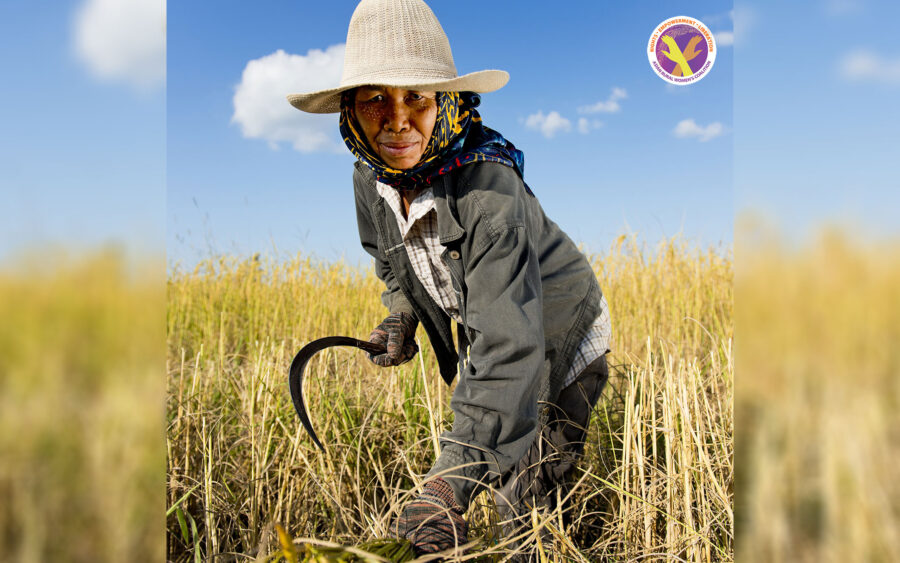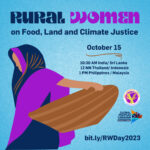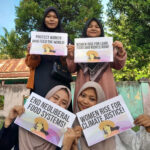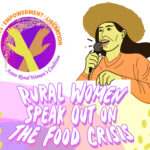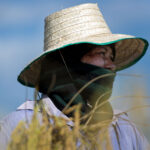Amid wars and crises, build rural women’s movements for rights, welfare, and genuine development
Statement of the Asian Rural Women’s Coalition for the October 15 International Rural Women’s Day 2024
Today, we commemorate the International Day of Rural Women, recognizing their essential role in agriculture, food security, and sustainable development. Rural women are the backbone of their communities, yet they continue to face formidable challenges worsened by economic downturns, conflicts, and environmental crises.
In Indonesia, rural women are grappling with the effects of prolonged deflation that has persisted for five consecutive months in 24 out of the country’s 38 provinces. The middle class continues to shrink due to massive layoffs of factory workers nationwide. Around 46,000 workers have lost their jobs as of August, making cash increasingly challenging to obtain. Falling agricultural prices have reduced household incomes in the rural areas. Despite this, the government of Indonesia encourages people to continue spending for economic stability.
As the primary managers of household resources, women bear the brunt of this economic pressure, limiting their ability to afford nutritious food, healthcare, and education for their families. Policy interventions to safeguard rural livelihoods and support women’s economic empowerment are questioned as the government continues to support private company interests over the needs of rural women.
Meanwhile, the ongoing genocide in Palestine perpetrated by Israel with the support of imperialist powers led by the United States, has far-reaching effects that extend beyond the region’s borders. These conflicts disrupt trade routes and drive fuel prices up, exacerbating economic hardships for vulnerable rural communities across Asia. Women, already facing precarious conditions, bear the brunt of this crisis as rising costs worsen their struggles. Moreover, the humanitarian emergency significantly increases the risks faced by migrant rural women working under insecure conditions. Imperialist-backed wars not only deepen inequality but also threaten the well-being of women. Since October 2023, more than 6,000 Palestinian women have been killed in Gaza by Israeli forces. Almost 937,000 women and girls have been displaced from their homes.
In Sri Lanka and Bangladesh, rural women face a dual threat: the climate crisis and corrupt governance. Frequent natural disasters, such as floods and droughts, disrupt agriculture and devastate livelihoods. However, government corruption worsens these problems, diverting essential resources away from rural communities. As a result, women struggle even harder to secure food, clean water, and healthcare, while state institutions fail to meet their needs. This neglect forces women to rely on informal networks and shoulder the burden of survival amid institutional failures.
In Burma, the military junta has turned much of the countryside into war zones, forcing women and children to live in refugee camps. The crisis in Burma often escapes international attention, further compounding the challenges facing rural women and the rest of the people.
The current imperialist system poses the greatest obstacle to the liberation and progress of rural women, sustaining a semi-feudal structure in many Asian countries. According to reports, rural women and youth have limited access to land, property, essential services, and opportunities like wage employment. Informality in rural areas exacerbates the situation and puts workers at a higher risk of vulnerability and inadequate working conditions. Thus, a shared struggle for genuine land reform unites most nations across Asia as they seek genuine development, especially for rural women.
The worsening global economic, political, and environmental crises most impact women, especially rural women. About 388 million women and girls lived in extreme poverty in 2022, based on global poverty estimates, with the number potentially rising to 446 million.
In these challenging times, there must be a concerted effort to build and strengthen rural women’s movements and demand for gainful and productive economic opportunities, access to essential social services, protection from the harmful effects of conflict and climate change, and rights to land and resources, among others. The Asia Rural Women’s Coalition (ARWC) is committed to building and strengthening such a movement to fight for rural women’s rights and welfare, promote genuine sustainable development, and build a truly just and peaceful society.

